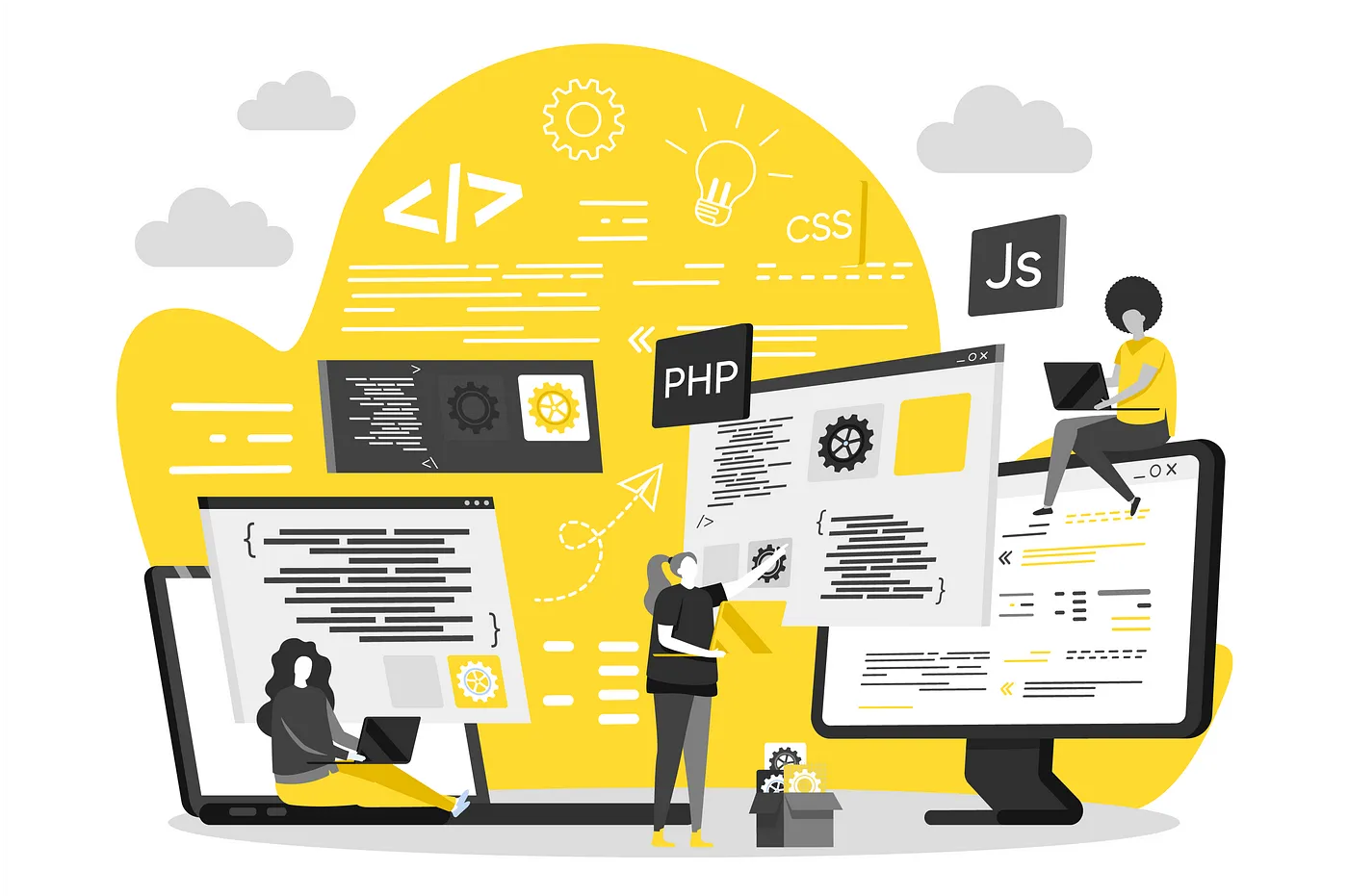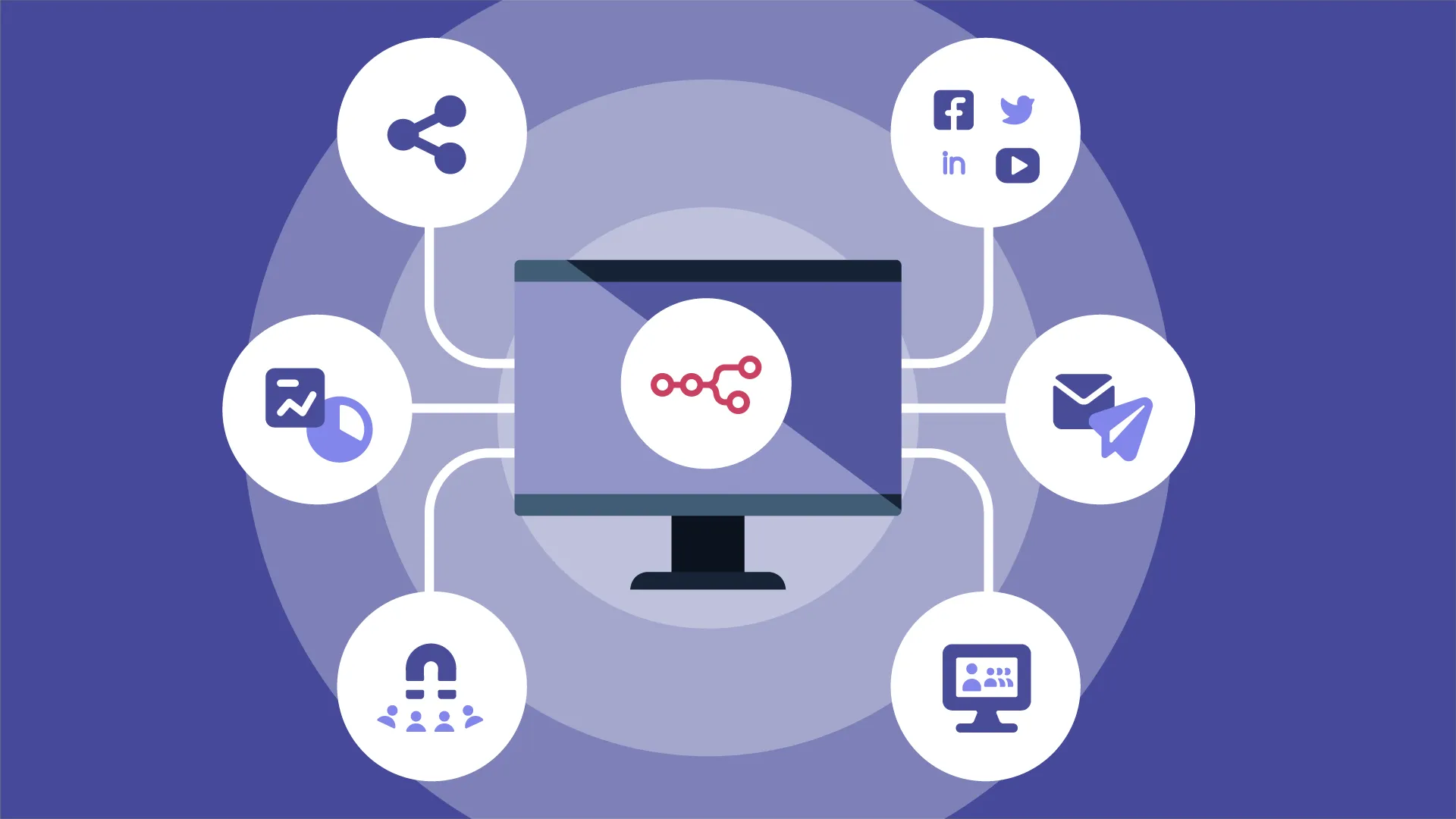Open-source software has revolutionized the way developers build, collaborate, and innovate. Offering accessibility, customization, and a collaborative spirit, open-source tools empower developers to create high-quality applications while sharing knowledge and resources. Whether you’re a front-end designer, back-end engineer, or full-stack developer, open-source software is an essential part of the development toolkit.
This article highlights 100+ top open-source software for developers, categorized into groups based on their purpose and functionality. Each group contains 10 tools, explained to showcase their features, benefits, and applications. These tools are must-haves for anyone aiming to optimize workflows and elevate their development projects.

Open-Source Text Editors and IDEs
Text editors and integrated development environments (IDEs) are essential tools for writing and managing code efficiently. Open-source solutions provide powerful features with the flexibility to customize according to your needs. Here are 10 of the best open-source text editors and IDEs for developers.
- Visual Studio Code
- Developed by Microsoft, VS Code is a lightweight yet powerful open-source editor. It supports extensions, debugging, and Git integration, making it a favorite among developers.
- Atom
- Known as the “hackable text editor,” Atom by GitHub allows deep customization with a wide array of plugins and themes. It’s ideal for developers who love to tweak their tools.
- Sublime Text (Community Edition)
- Sublime Text offers a clean interface with fast performance and robust features like multiple cursors and powerful search capabilities.
- Eclipse
- A popular open-source IDE, Eclipse is widely used for Java development but supports other languages like Python and C++ through plugins.
- IntelliJ IDEA Community Edition
- Known for its intelligent coding assistance, IntelliJ IDEA’s free community edition is perfect for Java and Kotlin developers.
- Brackets
- Brackets, by Adobe, is an open-source editor tailored for web development. It offers live preview and preprocessor support for CSS and JavaScript.
- Vim
- A classic editor known for its keyboard-driven navigation, Vim is lightweight and extremely efficient for power users.
- Emacs
- Another legendary editor, Emacs offers a highly extensible environment for programming, documentation, and even organizing tasks.
- NetBeans
- NetBeans is an open-source IDE ideal for Java, PHP, and HTML5 development. It offers strong debugging tools and cross-platform support.
- Geany
- Geany is a lightweight IDE with fast startup times and support for various programming languages, making it an excellent choice for quick edits.

Open-Source Version Control Systems
Version control is crucial for managing changes in code and enabling collaboration among developers. Open-source version control systems provide robust features to track, merge, and manage code versions. Here are the top 10 options for developers.
- Git
- The gold standard for distributed version control, Git allows developers to track changes, collaborate efficiently, and manage branching workflows with ease.
- Subversion (SVN)
- A centralized version control system, SVN is known for its simplicity and is still used by many legacy projects.
- Mercurial
- An open-source distributed version control system like Git, Mercurial is valued for its simplicity and performance.
- Bazaar
- A version control system that supports both centralized and distributed workflows, Bazaar is ideal for flexible team setups.
- Fossil
- Fossil integrates version control with bug tracking and a wiki, making it a lightweight all-in-one tool for project management.
- Plastic SCM (Community Edition)
- Plastic SCM offers graphical tools and branching workflows, suitable for teams that need more visual interaction with version control.
- Gogs
- A self-hosted Git service, Gogs is lightweight and easy to set up, making it ideal for smaller teams and individual developers.
- GitLab (Community Edition)
- GitLab provides Git-based version control along with CI/CD, issue tracking, and code review tools in its open-source edition.
- GNU Bazaar
- A flexible version control system, GNU Bazaar supports multiple workflows and has strong cross-platform compatibility.
- Darcs
- Known for its simplicity, Darcs offers distributed version control and an intuitive patch-based workflow.

Open-Source Build and Automation Tools
Efficient build and automation tools streamline workflows, reduce repetitive tasks, and ensure consistent results across environments. These open-source tools are essential for modern software development.
- Apache Maven
- A widely used build automation tool for Java projects, Maven also manages project dependencies and generates documentation.
- Gradle
- A powerful build tool for Java, Kotlin, and more, Gradle offers performance optimization and integration with IDEs like IntelliJ IDEA.
- GNU Make
- The original build automation tool, GNU Make is widely used for compiling C and C++ projects.
- CMake
- A cross-platform build system, CMake is popular for creating makefiles and project files for multiple IDEs.
- Ant
- Apache Ant is another popular Java build tool with XML-based configuration and a focus on portability.
- Bazel
- Developed by Google, Bazel offers fast, reproducible builds for large-scale projects with complex dependencies.
- CircleCI (Open Source Components)
- CircleCI provides an open-source CI/CD toolset that automates builds, tests, and deployments.
- Jenkins
- A popular open-source automation server, Jenkins helps automate tasks like building, testing, and deploying applications.
- Travis CI (Open Source Projects)
- Travis CI offers free, open-source CI/CD pipelines for public repositories, integrating seamlessly with GitHub.
- Fastlane
- A tool for automating mobile app builds, Fastlane is widely used for iOS and Android development workflows.

Open-Source Web Development Frameworks
Web development frameworks simplify the creation of robust, scalable, and dynamic websites and applications. These open-source frameworks empower developers to focus on building features without reinventing the wheel. Here are 10 top open-source web development frameworks for modern developers.
- React
- Maintained by Meta, React is a popular JavaScript library for building user interfaces. Its component-based architecture makes development faster and more efficient.
- Angular
- Developed by Google, Angular is a comprehensive front-end framework for building dynamic, single-page applications (SPAs) with TypeScript.
- Vue.js
- Vue.js is a lightweight, progressive framework for building interactive web applications. Its simple integration and flexibility make it a developer favorite.
- Django
- A high-level Python framework, Django simplifies back-end development with built-in tools for authentication, database handling, and security.
- Ruby on Rails
- Known for its “convention over configuration” approach, Rails accelerates back-end development by providing ready-to-use structures for common tasks.
- Express.js
- A minimalist framework for Node.js, Express.js provides a flexible and lightweight foundation for building server-side web applications.
- Flask
- Flask is a micro-framework for Python that offers simplicity and control, making it ideal for lightweight web applications.
- ASP.NET Core
- Microsoft’s open-source framework for building cross-platform web apps with C#. It’s powerful and widely used for enterprise-level applications.
- Laravel
- A PHP framework known for its elegant syntax, Laravel simplifies common tasks like routing, authentication, and caching.
- Spring Boot
- Built on the Spring Framework, Spring Boot is an open-source tool for creating production-ready Java applications with minimal configuration.

Open-Source Databases
Databases are at the core of software development, providing efficient storage and retrieval of data. Open-source database solutions offer scalability, performance, and flexibility for a wide range of applications. Here are the best open-source databases for developers.
- MySQL
- One of the most popular open-source relational databases, MySQL is known for its reliability, scalability, and ease of use.
- PostgreSQL
- A powerful, feature-rich relational database that supports advanced features like JSON, full-text search, and custom data types.
- SQLite
- A lightweight, self-contained database engine often used for embedded applications, prototyping, and mobile app development.
- MongoDB Community Edition
- A NoSQL database that stores data in flexible, JSON-like documents, ideal for modern applications requiring scalability.
- Cassandra
- A distributed database known for handling large amounts of data with high availability, commonly used for big data projects.
- Redis
- An in-memory key-value store that offers lightning-fast data retrieval, often used for caching and real-time analytics.
- MariaDB
- A fork of MySQL, MariaDB offers advanced features, better performance, and an open governance model.
- CockroachDB
- A distributed SQL database designed for high resilience and scalability, perfect for global applications.
- Neo4j
- A graph database ideal for applications requiring complex relationship queries, such as social networks or recommendation systems.
- Elasticsearch
- An open-source search and analytics engine, Elasticsearch is widely used for full-text search, log analytics, and more.

Open-Source Front-End Libraries and Tools
Front-end development thrives on creativity, and open-source tools simplify the process of designing, building, and optimizing user interfaces. Here are 10 essential open-source libraries and tools for front-end developers.
- Bootstrap
- A popular CSS framework for responsive web design, Bootstrap provides pre-designed components and a grid system for quick prototyping.
- Tailwind CSS
- A utility-first CSS framework that allows developers to create custom designs without leaving their HTML files.
- jQuery
- This classic JavaScript library simplifies DOM manipulation, event handling, and animations with an easy-to-use syntax.
- Sass (Syntactically Awesome Stylesheets)
- A preprocessor scripting language that extends CSS with variables, nesting, and mixins for more maintainable stylesheets.
- Chart.js
- A JavaScript library for creating interactive, customizable charts and graphs, perfect for data visualization.
- D3.js
- A powerful library for creating dynamic, data-driven visualizations using SVG, HTML, and CSS.
- Lottie
- An open-source tool for rendering animations created in Adobe After Effects as JSON, enabling lightweight, high-quality animations.
- GSAP (GreenSock Animation Platform)
- A robust library for creating advanced animations, including scroll effects, transitions, and dynamic interactivity.
- Material-UI
- A React-based UI library implementing Google’s Material Design guidelines, offering pre-built components for polished designs.
- Figma Plugins (Community-Contributed)
- Open-source plugins enhance Figma’s capabilities for front-end design, offering tools for layout, accessibility checks, and more.

Open-Source DevOps and CI/CD Tools
In modern software development, DevOps practices and Continuous Integration/Continuous Deployment (CI/CD) pipelines are essential for efficient collaboration and delivery. Open-source tools in this domain empower developers to automate workflows, manage infrastructure, and ensure seamless deployments. Here are 10 essential open-source DevOps and CI/CD tools.
- Docker
- A leading containerization platform, Docker allows developers to build, ship, and run applications in isolated environments, ensuring consistency across systems.
- Kubernetes
- Kubernetes is an open-source container orchestration platform that automates deployment, scaling, and management of containerized applications.
- Ansible
- A configuration management and automation tool, Ansible simplifies provisioning, deployment, and orchestration with human-readable YAML scripts.
- Terraform
- Terraform by HashiCorp enables Infrastructure as Code (IaC), allowing developers to define and provision cloud infrastructure programmatically.
- Jenkins
- Jenkins is a widely-used automation server that facilitates CI/CD pipelines, offering extensive plugin support and integration options.
- GitLab CI/CD
- An integrated part of GitLab’s open-source edition, this tool automates testing, building, and deploying code directly from repositories.
- Prometheus
- A monitoring and alerting toolkit, Prometheus is designed for cloud-native environments, offering robust query capabilities and integrations.
- Grafana
- Grafana is an open-source visualization tool that works seamlessly with Prometheus and other data sources for monitoring and analytics dashboards.
- Travis CI (Free for Open Source)
- Travis CI automates builds and testing for public GitHub repositories, making it a go-to for open-source CI/CD pipelines.
- Helm
- Known as the “package manager for Kubernetes,” Helm simplifies the deployment and management of Kubernetes applications.

Open-Source Testing and Quality Assurance Tools
Testing and quality assurance are critical components of software development. Open-source testing tools help developers ensure their code is bug-free, secure and performs as expected. Here are 10 top open-source tools for testing and QA.
- Selenium
- A popular open-source framework for web testing, Selenium automates browser actions and supports multiple programming languages.
- Jest
- Created by Meta, Jest is a JavaScript testing framework designed for React and other front-end libraries, offering a simple API and great performance.
- Mocha
- A feature-rich JavaScript testing framework that runs on Node.js, Mocha provides flexibility for both unit and integration testing.
- JUnit
- A widely-used testing framework for Java, JUnit supports test-driven development (TDD) with annotations and assertions.
- Cypress
- Cypress is a next-generation front-end testing tool designed for modern web applications, offering fast and reliable test execution.
- Appium
- An open-source testing framework for mobile apps, Appium supports native, hybrid, and mobile web app testing on iOS and Android.
- Postman (Open Source Elements)
- Postman automates API testing, allowing developers to create, run, and monitor test suites with ease.
- Karma
- Karma is a test runner for JavaScript that integrates seamlessly with testing frameworks like Jasmine and Mocha.
- SonarQube
- A code quality and security analysis tool, SonarQube identifies bugs, vulnerabilities, and code smells across multiple languages.
- ZAP (Zed Attack Proxy)
- An open-source security testing tool by OWASP, ZAP helps developers identify vulnerabilities in web applications.

Open-Source Tools for Mobile App Development
Mobile app development requires specialized tools to handle unique challenges like multi-platform compatibility, UI design, and performance optimization. These open-source tools simplify the process and enable developers to create high-quality mobile applications.
- Flutter
- Flutter by Google is a cross-platform UI toolkit that uses a single codebase to build native-like apps for iOS and Android.
- React Native
- React Native allows developers to create mobile apps using JavaScript and React, offering near-native performance.
- Ionic Framework
- Ionic is a hybrid app framework that combines Angular, React, or Vue with web technologies to build cross-platform mobile apps.
- Cordova
- Apache Cordova enables developers to build mobile apps using HTML, CSS, and JavaScript, bridging the gap between web and native apps.
- NativeScript
- A framework for building native mobile apps using TypeScript or JavaScript, NativeScript provides access to native APIs.
- Kivy
- Kivy is an open-source Python framework for building multi-platform apps with a natural user interface.
- Android Studio (Open Source Components)
- Google’s official IDE for Android development integrates open-source tools like Gradle and Kotlin for efficient app building.
- Expo
- Built on React Native, Expo simplifies app development with pre-configured tools, making it beginner-friendly.
- Swift Playgrounds
- Although designed for learning, Swift Playgrounds provides a powerful open-source environment for prototyping iOS apps.
- Unity (Open Source Libraries)
- While Unity is a commercial engine, its open-source libraries support mobile app development, especially for game apps.

Open-Source Tools for Data Science and Machine Learning
Data science and machine learning are at the forefront of modern technology, and open-source tools are essential for developing and deploying intelligent systems. These tools provide the frameworks, libraries, and platforms to analyze data, build models, and gain insights. Here are 10 must-have open-source tools for data science and machine learning.
- TensorFlow
- Developed by Google, TensorFlow is a powerful open-source library for machine learning and deep learning, supporting a wide range of applications.
- PyTorch
- An open-source framework by Meta, PyTorch excels in flexibility and dynamic computation graphs, making it a favorite for research and production.
- Scikit-learn
- A Python library for machine learning, Scikit-learn offers tools for classification, regression, clustering, and more.
- Pandas
- Pandas is an essential Python library for data manipulation and analysis, providing powerful tools for handling structured data.
- NumPy
- NumPy offers fast and efficient numerical computations, providing foundational tools for data analysis and scientific computing in Python.
- RStudio
- An open-source IDE for R programming, RStudio is a favorite among data scientists for statistical analysis and visualization.
- Jupyter Notebook
- Jupyter provides an interactive environment for writing and sharing live code, equations, and visualizations, widely used in data science.
- Keras
- Built on TensorFlow, Keras simplifies the creation of deep learning models with a user-friendly API.
- Matplotlib
- A Python library for creating static, animated, and interactive visualizations, Matplotlib is widely used for data plotting.
- Hugging Face Transformers
- Hugging Face provides open-source libraries for natural language processing (NLP), enabling tasks like text generation and sentiment analysis.

Open-Source Security Tools
In an era where cybersecurity is paramount, developers need reliable tools to ensure their applications and systems are secure. Open-source security tools help identify vulnerabilities, manage risks, and protect data. Here are 10 essential open-source security tools for developers.
- Metasploit Framework
- A widely used penetration testing tool, Metasploit helps developers identify vulnerabilities and strengthen their applications’ defenses.
- Wireshark
- Wireshark is a network protocol analyzer that helps developers monitor and troubleshoot network traffic in real time.
- Nmap (Network Mapper)
- Nmap is a powerful tool for network discovery and security auditing, widely used by security professionals and developers.
- OpenVAS
- OpenVAS is a comprehensive vulnerability scanner that detects potential security issues in applications and networks.
- OSSEC
- An open-source host-based intrusion detection system (HIDS), OSSEC monitors and alerts about unauthorized activities.
- ClamAV
- ClamAV is an open-source antivirus engine designed to detect and remove malware, making it ideal for securing applications and servers.
- Nikto
- A web server scanner, Nikto identifies vulnerabilities and outdated software in web applications.
- Burp Suite Community Edition
- Burp Suite’s open-source version provides basic tools for web application security testing, including vulnerability scanning.
- Snort
- An open-source network intrusion detection system (NIDS), Snort analyzes network traffic and detects suspicious activity.
- HashiCorp Vault
- Vault is an open-source tool for securely managing secrets, API keys, and sensitive data within your applications.

Open-source software has become the backbone of modern development, enabling innovation, collaboration, and efficiency. This list of 100+ top open-source tools for developers spans a wide range of functionalities, from coding and version control to machine learning and cybersecurity. By adopting these tools, developers can enhance their workflows, optimize their projects, and contribute to the vibrant open-source community.
Whether you’re a beginner exploring new possibilities or a seasoned professional refining your craft, these tools provide the flexibility and power to tackle any challenge. Open-source software isn’t just about cost-effectiveness—it’s about accessibility, transparency, and the spirit of collaboration.










